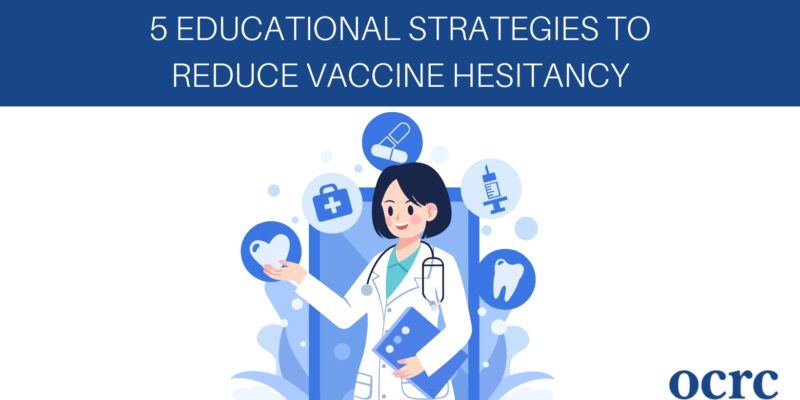
Vaccine hesitancy came to the forefront during the COVID-19 pandemic, but medical researchers and physicians have been concerned about its implications for years.
Currently, distrust in vaccines appears to be at an all-time high. This hesitancy has been a driving force in the spike of measles outbreaks that took place in 2019, when 1,200 cases were reported throughout the country. It’s also a factor in the number of cases associated with other preventable diseases in the United States, including the flu.
To effectively address vaccine hesitancy, medical professionals can draw on educational strategies that explain the truth in simple terms. Learn more about five of the best ways to approach vaccine hesitancy.
It’s essential not to group people who are vaccine-hesitant together. Hesitancy occurs in all communities as well as in all socioeconomic and education levels. A lack of information doesn’t correlate with vaccine hesitancy, and many of those with concerns do seek out guidance from their doctors and pharmacists.
Those are the moments where real change can occur. Pharmacists, physicians, and other healthcare professionals can address worries without shaming. They can listen to specific concerns, taking care to correct mistaken information without overloading the person with technical language.
If you’re addressing concerns about vaccines, you need to know the latest data and be aware of the current questions that the community has. Specific worries about vaccines can change, and if you’re only addressing old misconceptions, you’re not likely to encourage vaccine acceptance.
Provide updated information on possible side effects and help people understand the risks of not getting the vaccinations. The goal is not to fearmonger but to offer facts that will make an impact.
Addressing widespread vaccine hesitancy requires reaching out to people, not waiting for them to come to you. Go to the communities where vaccine hesitancy appears to be higher with information that is easily digestible.
Consider not only concerns about the vaccine itself but also worries about access, cost, and other factors that could keep people from getting preventive care. Face-to-face conversations tend to be the most effective, but digital outreach efforts can also help people who are concerned about vaccination.
Vaccination levels tend to increase when community leaders recommend them or offer pro-vaccine messages. Hesitancy can be eroded by hearing information from a trusted person. This means that reaching out to community leaders can be an effective strategy.
These leaders’ messages must be tailored to their communities. That includes addressing cultural and religious worries that may be preventing people from considering vaccinations.
Explain how vaccines are made, the research involved, and the rigorous testing they go through. Reaching out to members of the community who are known to be pro-vaccination can also help you make the first approach to leaders.
There are lots of common myths about vaccines. However, focusing your efforts on debunking these myths can have a counterproductive effect. Any perceived misstep you make in an attempt to dispel the myth can actually reinforce it.
It’s better to present information without touching on any rumors that may be making their way through social media. Trying to debunk myths will also create a more adversarial tone to the conversation, and that’s not what you want. Focus on the truth of the vaccine and why it is beneficial without touching on inflammatory topics.
Reducing vaccine hesitancy is a team effort that relies on people from all communities and walks of life. It’s not enough to have scientists and physicians advocating for a vaccine; you need local leaders, corner-store pharmacists, and people who are more connected to their communities than doctors who are only seen once or twice a year.
By offering information in a way that is easy to understand without engaging in arguments, it’s possible to slowly start turning the tide on vaccine hesitancy.
At Orlando Clinical Research Center, we’re dedicated to advancing clinical research. We specialize in conducting phase I-IV clinical trials at our state-of-the-art facility in Orlando, FL. Learn more about the trials we’re currently running and how you can get involved.
